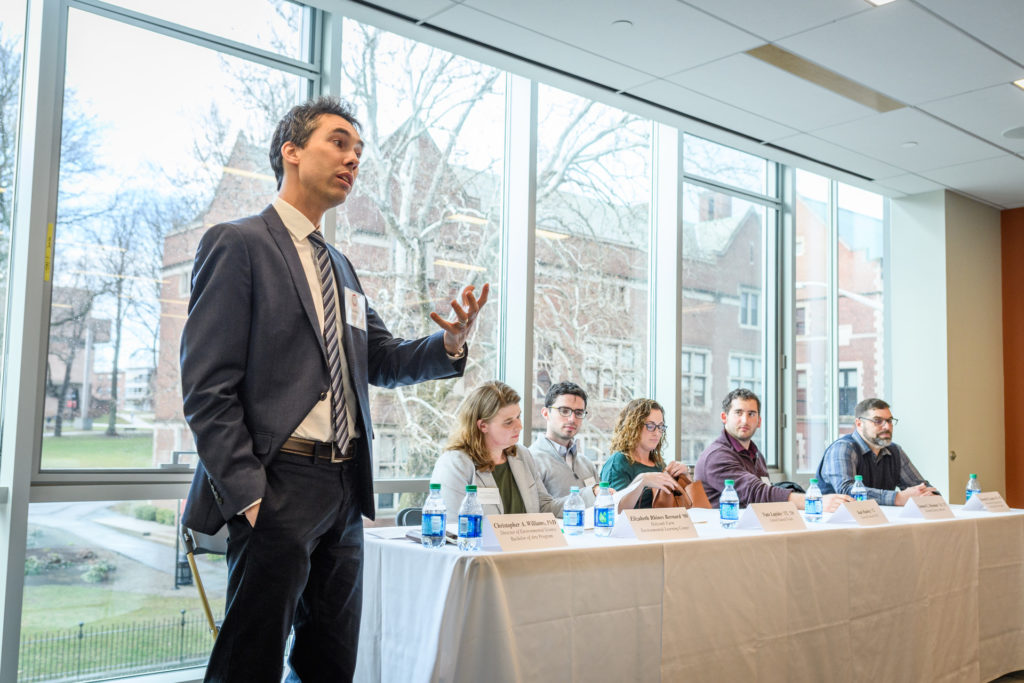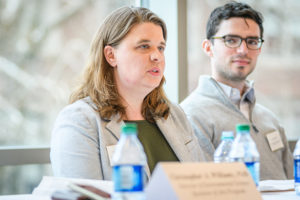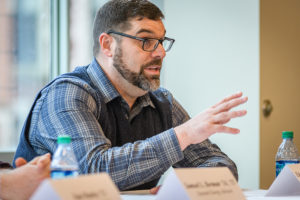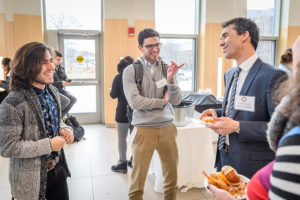
Clark alumni recently returned to campus to share their insights with budding environmental scientists about their educational and career pathways and strategies for how best to prepare for a successful professional future.
The April 4 event, Practicing Environmental Science, was organized and hosted by Christopher A. Williams, director of the undergraduate program in Environmental Science and an associate professor of Geography. Featuring two panels of alumni and employer representatives drawn from area companies, state offices, and NGOs, participants offered career tips and talked about exciting directions in the market. A wide range of topics was covered, such as how to discover one’s passion, strategies for building a network, navigating the job market, ways to persevere in the face of failure, and developments in the field.

“Remember the why,” said Beth Rhines Bernard, ES&P ’00, noting that recalling the reasons why you’re drawn to a particular career can fuel you when you meet a roadblock or get worn out. Bernard has worked at organizations ranging from museums and nature centers, to summer camps and advocacy groups, and is now the program director for the James L. Goodwin State Forest in Hampton, Conn.
Kate Hanley, MBA/ES&P ’12, earned her economics degree at the University of North Carolina at Chapel Hill, where she developed a passion for environmental science. Today, she combines her Clark dual degree in environmental science and business with her economics background, serving as the director of sustainability for the town of Concord. It’s a newly created position that stems from Concord’s mission to reduce carbon emissions 80 percent by 2050. That would sound daunting to some, but not to Hanley, who said she has found herself in new roles several times in her young professional life. When a student expressed worry about what one should do if they feel under-qualified for a job assignment, Hanley joked, “Fake it till you make it.” She advised students not to be afraid to “learn as you go,” and that it’s a key to success.
Nate Lapides ’15, M.S. ’16, said his career story is just starting to unfold. As a sustainability and philanthropy analyst for United Natural Foods, Lapides is an integral part of a small team in a large organization. UNFI serves customers in the United States, Canada, and more than 40 other countries. He stressed the importance of being a “good team player,” and said it’s important to be well-versed in “soft” skills that help you work with people from dissimilar backgrounds.

“Never stop learning,” said Edward M. Connor ’01, M.S. ’12, a dam safety engineer for the Massachusetts Department of Conservation and Recreation. Applying this simple approach on the job, he believes, allows him to bridge multi-generational practices, from traditional slide-rule methods to today’s cutting-edge technological solutions like 3D computer simulations. He said this allows him to easily relate to his colleagues and address problems from multiple angles.
Samuel L. Berman ’14, M.S. ’15, an analyst for Daymark Energy Advisors, told the students he has learned there will be times he doesn’t know the solution to a problem, but he knows the questions to ask to get to the solution. He also noted that when reading through a job applicant’s résumé, he wants to see the person’s passion jump off the page.
Additional panelists included:
- Sam Swartwout ’05, a senior GIS analyst for Tighe & Bond, a New England-based engineering and environmental consulting firm
- Evan Marshall ’14 (Geography/Environmental science), the land information systems coordinator for the Massachusetts Audubon Society
- Colin Novick, executive director, Greater Worcester Land Trust

The event also featured research presentations by undergraduate students (Tyler Anderson ’18, Meyru Bhanti ’18, Daniel Oliveira ‘19, Savannah Sanford ’17, and Alexis Stabulas ’18). Held in the Shaich Family Alumni and Student Engagement Center, the event was also supported by several across-campus partners including the LEEP Center, ClarkCONNECT, and IDCE (International Development, Community, and Environment Department).
Clark students received practical advice about how to apply for jobs, what employers are looking for, and ways to channel their passions into a satisfying career. Bernard also advised them to keep things in perspective and not to panic about making perfect choices right out of college — that they will have time and opportunities to establish themselves. “Whatever you decide now is like one-millionth of your life,” she said, encouraging students to try things and to get involved.


